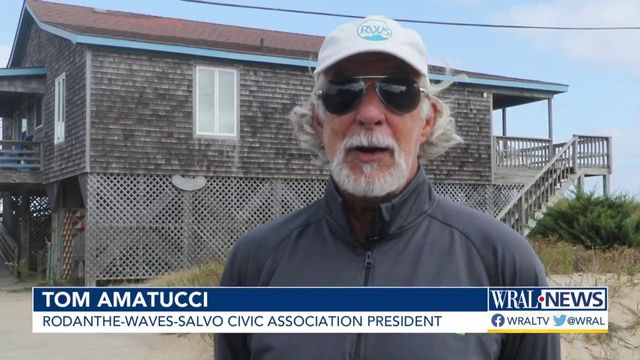Outer Banks homes keep falling into the ocean, and septic tanks causing issues
Millions watched the videos of a house falling into the Atlantic Ocean in May, the third this year, but now several more houses in Rodanthe on the Outer Banks are in danger of meeting the same fate.
Posted — Updated“We’re on a section of shore that experiences very high erosion rates," said Alyson Flynn, a coastal advocate. "These homes, while they might not have been built this close to the ocean years ago, over time the beach has eroded so quickly and so dramatically that these homes are literally on portions of the public trust beaches.”
More than 20 homes are considered to be in danger of falling into the ocean.
“It’s time to start reevaluating and readjusting what our traditional thought processes are with houses being directly on the ocean," said Dare County commissioner Danny Couch.
The prospect of more houses going down is one that is frustrating to many, especially those who were called in to help clean up the debris left behind the last time.
“We’re known for our beaches and our main source of income for everybody here is tourism, so you have to keep beaches clean so people will continue to come here," said photographer Daniel Pullen. "In order to do that you can’t have houses falling in every storm.”
Aside from posing a major safety hazard and the massive debris field that was left behind after the last homes fell, there’s another problem that many people aren’t necessarily aware of.
“One of the biggest problems is that these homes all have septic tanks," Flynn explained. "Some have multiple septic tanks because, over the years, as their septic tanks have become compromised, these homes have been allowed to replace their tanks so they can continue to rent or live in these properties. One of the issues that creates is a lot of different septic tanks on the oceanfront that are spewing out wastewater onto the public beach because these drain fields are now on the public ocean front. It’s a tragedy to see families here on vacation and setting up building sand castles in a drain field of wastewater.”
The Coastal Federation, along with the N.C. Division of Coastal Management, is trying to get a rule put in place that would keep these homes from continually being able to replace their septic tanks in the hopes of keeping the beaches clean and safe for visitors.
“These tanks are supposed to be watertight, and they are supposed to be buried so the septic water isn’t readily spewing out onto the beach, but that’s not the case," Flynn said. "A lot of times you can see wastewater spewing out onto the beach.”
Couch said it is crucial to find solutions that not only take into consideration the rights of these homeowners but also protect the beaches and those who use them.
“These things very much shape public perception -- the guy in Kansas who sees a house falling in the ocean, that’s going to shape his perception of the Outer Banks," Couch said.
The Coastal Resources Commission is meeting Nov. 17 to consider amending its rules regarding the siting of replaced or relocated septic systems along our oceanfront. Meetings between the National Park Service, Dare County and homeowners are also taking place to try and figure out what else can be done.






